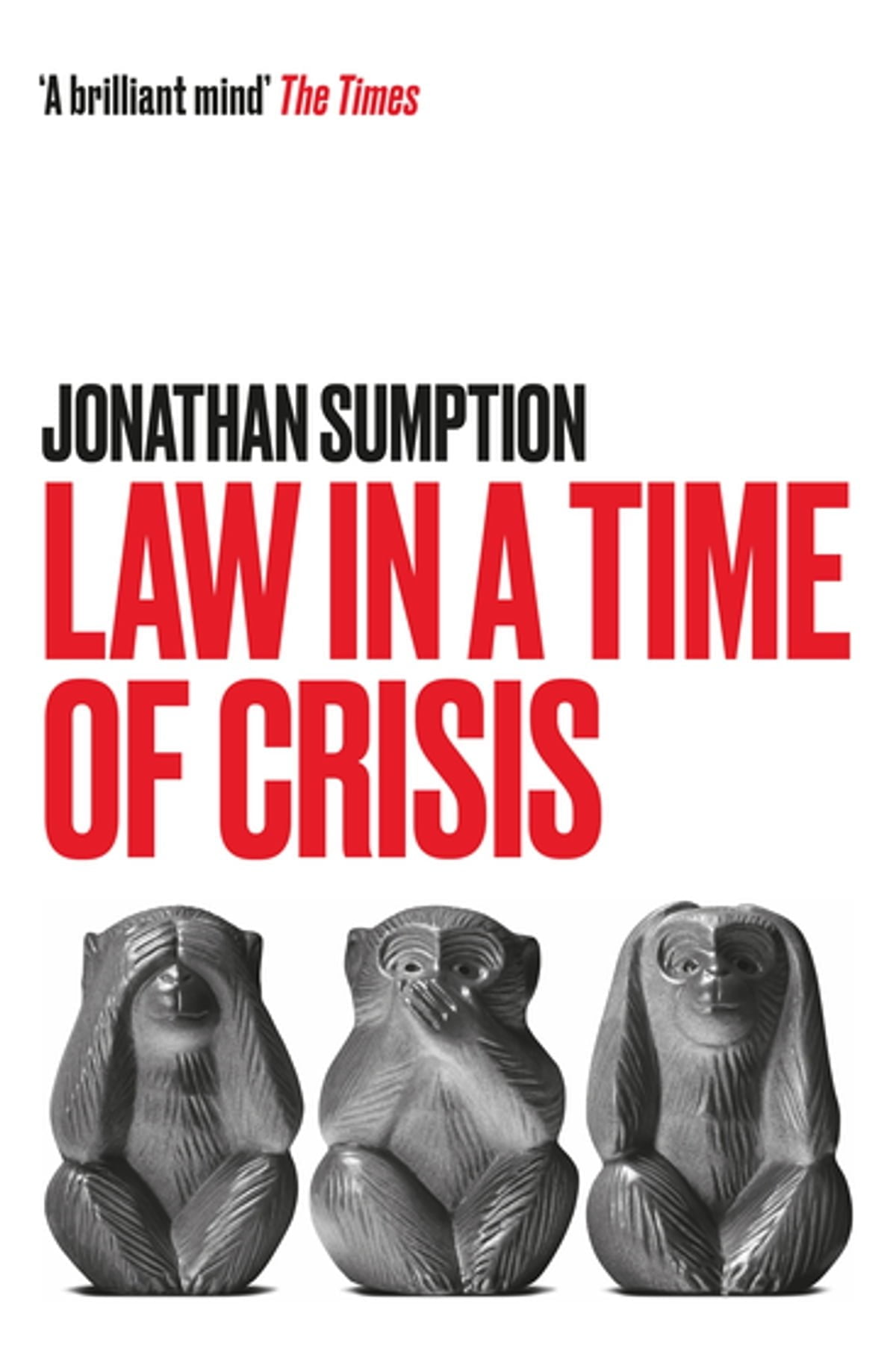In Context
Lord Jonathan Sumption’s collection of essays touches on a wide range of important issues of our time, including the importance of history in understanding the present, how history can be misused to the detriment of social cohesion, what the “Brexit crisis” reveals about the nature of British society and its institutions, and the dangers for a free society that fetishizes safety. The essays are based on highly prestigious lectures delivered by Lord Sumption over the past decade, all of them updated where necessary.
Big Ideas
- Perpetuating historical grievance creates new injustices as people today are judged guilty by the sins of their ancestors
- Societies are not so much imperiled when people widely and deeply disagree on certain controversial issues, but when they no longer collectively esteem the political system through which these issues are disputed
- The more safety-preoccupied and risk-averse our society becomes, the more open we are to having our rights and liberties permanently curtailed
Use and Abuse of History
Many nowadays say that people neither know nor care about history. Perhaps it is more accurate to say that people only know or care about it in part. Specifically, those parts that damn the West. But as Sumption says, “to present what was bad about our past as though it was the whole is to falsify history.” [24]
In the Anglophone West we have become preoccupied with the alleged villains and iniquities of our past, to the point of tearing down historic monuments and changing the names of our buildings and institutions to erase any tribute to or memory of those whose lives and deeds do not measure up to today’s righteous standards.
Sumption focuses on our modern habit of making apologies for the past, as though the people of the present bear some kind of responsibility for the behaviour of people in the past. Or what Sumption calls “inherited” and “transmitted” guilt.
But the problem, according to Sumption, is not merely the question of how fair it is to judge people of the past by our own standards, but also how the current preoccupation with past injustices serves to perpetuate present-day grievance and generate both new injustices and socially destabilizing divisions.
“As it happens, the most famous illustration of the concept of transmitted guilt is also one of the most manifestly wicked. The justification advanced in the first sixteen centuries of European Christianity for the persecution of the Jews was that they had a collective and inherited responsibility for the death of Christ.” [18]
Sumption makes his point clear: “It is at least as likely that by accepting the practice of political apology for the past, we simply perpetuate the grievance by making it heritable.” [20]
For example, critical race theory encourages the notion of inherited “white” guilt as it teaches that to be white is necessarily to be racist. This was spectacularly embodied in the Black Lives Matter movement, particularly in 2020 which saw BLM protests and riots in the USA and England causing billions of dollars in damage and costing dozens of innocent lives, particularly in America.
Inherited guilt can actually generate injustice.
Collective Identity and Brexit
Sumption was a remainer. Although he saw the shortcomings of the European Union (EU), chief of which was its increasingly undemocratic nature, he believed it better for Britain to remain a member, and thus have a say in the European Parliament, than to exit and have no say at all while still being dominated by that massive entity. But rather than demonizing those who successfully voted to leave the EU as ignorant and xenophobic, Sumption wishes to understand the Brexit movement. For Sumption Brexit teaches us a powerful lesson: national identity matters, and denying it leads to social fragmentation.
One way denying national identity can lead to social fragmentation is when radical immigration policies are pursued without considering how well the immigrants will be able to integrate into their new society. Over the past decade Britain has had the highest level of immigration in Europe after Germany. As well as putting downward pressure on wages, this immigration programme has raised concerns about “the identity of traditional communities.” [167]
Generally speaking, the British were never affectionate for the EU, merely considering it an economic contract, certainly not a grand political project, as its founders and current technocrats envisage it. It must be said that most European countries are first and foremost nativist rather than European by identity. For Sumption, the “European project” will never be as secure as its most ardent advocates wish it to be, simply because “a European identity is an essential requirement for the European project to succeed.” [183]
In terms of what caused what Sumption calls “the Brexit crisis” [187], he boils it down to three factors:
- Using the mechanism of a referendum
- The advent of a minority government
- The collapse of a shared political culture
If the decision had been left to parliament Brexit may have happened eventually, depending on the public appetite, but certainly not in 2016. The other effect of the referendum was to create a tremendous sense of victory and entitlement among Brexiteers, making compromise with remainers almost impossible. It was as though the 17.4 million Brexiteers who voted to leave had forgotten that, like it or not, 16.1 million of their compatriots voted to remain.
The May government found itself in the unenviable position of having to steer through a very controversial policy – one of the most controversial in British history, according to Sumption – with massive opposition to the policy in the House of Commons, and even within its own party. This led to the Brexit arrangements being drawn out and politically toxic.
Finally, there was a disregard for historical precedent – if not the English Constitution itself – by way of proroguing parliament and courts intervening to determine issues that should have been left to parliament. This absence of political forbearance further undermined a shared commitment to long-standing conventions that have brought unprecedented historic stability to the British system of government.
In fact, Sumption sees the decline of a unified sense of national identity and solidarity as central to the tumultuous nature of the Brexit process. Over the decades the British have found less and less to collectively esteem: not their history or their culture, which are increasingly seen as at best boring and irrelevant, or at worst, oppressive, and finally, not their institutions. But here is also the key for the future of a stable Britain. What is needed is for a people who are deeply divided on questions relating to national history and identity, not to mention on Britain’s relationship to global institutions like the EU, to at the very least seek to agree on how to resolve their disagreements:
“People hardly ever unite around a policy, least of all one as controversial as Brexit. The only thing that ever has or ever will unite us is a common loyalty to a way of conducting our affairs that we can respect even if we disagree about the outcome….These are not just optional extras or rules of courtesy. They are fundamental to the survival of the democratic state.” [204]
Covid and the Political Risk of Safety
Modern technology and medicine have made us safer than ever, but they seem also to have made us more risk averse than ever. In other words, the safer and healthier we become, the more strange and, therefore, dangerous and menacing risk and ill health appear to us. Politically this has proven to be dangerous. As Sumption says, “people are no longer disposed to accept the wheel of fortune as an ordinary incident of human existence. They regard physical security not just as the normal state of affairs but as an entitlement.” This, says Sumption, has led to “higher expectations of government, to some extent encouraged by governments themselves.” [132]
Nothing demonstrates the political risk of safety culture more than the British government’s response to the Covid 19 pandemic, which, according to Sumption, “authorised…the most significant interference with personal freedom in the history of our country.” [218] Indeed, “I believe that history will look back on the measures taken to contain it as a monumental collective hysteria and governmental folly.” [218] The original lockdown was imposed without any parliamentary scrutiny until seven weeks later in May 2020. Some of the most draconian laws in British history were imposed on citizens without parliamentary scrutiny, or based on an act (the Coronavirus Act) that did not actually license them (general lockdowns of the healthy). Sumption is damning: the British government exercised a “cavalier disregard for the limits of their legal powers” [225], sometimes turning Britain into a “police state” [230], using “propaganda” that was “necessary in order to justify the extreme steps…and to promote compliance.” [232]
How did this happen? Sumption sees the causes as complex, but largely coming down to a social craving for security exploited by government, technocracy, and media:
“Our society craves security. The public has unbounded confidence, which no amount of experience will dent, in the benign power of the state to protect them against an ever-wider range of risks. In Britain, the lockdown was followed by a brief period in which the government’s approval ratings were sky-high. This is how freedom dies….Historically, fear has always been the most potent instrument of the authoritarian state. This is what we are witnessing today. But the fault is not just in our government. It is in ourselves.” [231]
Commentary
Lord Sumption’s essays are sure to generate much debate, even among those who would identify as conservative. He busts historical myths about the importance of the Magna Carta for English liberty, sets out arguments in favour of the remain case for Brexit, and attacks Britain’s Covid response as authoritarian and totalitarian. But along the way there are eternal lessons imparted on the nature of democracy, the importance of history, national identity, quotas in political representation, and the importance of a virtuous society for a well-functioning political system. Lord Sumption’s book is a window into one of Britain’s sharpest minds, but a mind always measured and, despite the hard truths it imparts, never without hope.




